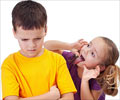Children of undocumented Mexican immigrants have a higher risk of behavior problems than their co-ethnic counterparts with documented or naturalized citizen mothers, claims a new study.

"To our knowledge, our study is the first study based on a representative sample to investigate differences in the behavioral functioning of youth with undocumented versus documented parents," said Nancy S. Landale, a liberal arts research professor of sociology and demography at Pennsylvania State University and the lead author of the study, which appears in the March issue of the Journal of Health and Social Behavior.
"We found that treating Mexican children with immigrant parents as a single undifferentiated group masks important differences in outcomes by parental legal status."
Titled, "Behavioral Functioning Among Mexican-Origin Children: Does Parental Legal Status Matter?," the study, which relies on data on more than 2,500 children ages 3 to 17 from Los Angeles County and their mothers, was co-authored by Jessica Halliday Hardie, an assistant professor of sociology at Hunter College, City University of New York; R.S. Oropesa, a professor of sociology and demography at Pennsylvania State University; and Marianne M. Hillemeier, a professor of health policy and administration and demography at Pennsylvania State University.
Among the children of Mexican immigrants in their sample -- which also included children of U.S.-born Mexican mothers, as well as children whose mothers are non-Mexican Latinos, Asians, blacks, and whites of various immigration statuses -- 36 percent had an undocumented mother. According to the researchers, approximately half of Mexican immigrants are undocumented, and Mexican-origin children comprise 70 percent of children with unauthorized immigrant parents in the United States.
So what causes children of undocumented Mexican immigrants to have more behavioral problems than their co-ethnic counterparts with documented or naturalized citizen mothers?
Advertisement
In terms of the study's policy implications, Landale said the study reveals that children of undocumented Mexican mothers are at risk of experiencing behavior problems that may adversely affect their life chances, and she believes their access to mental health services may be limited by: family poverty; a lack of health insurance; language barriers; parents' limited awareness of mental health resources; and parents' reluctance to seek assistance from service providers because of fear of detection, apprehension, and deportation.
Advertisement
Source-Medindia










